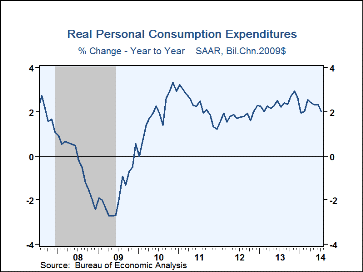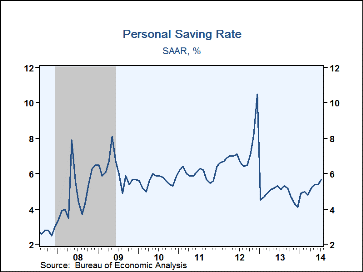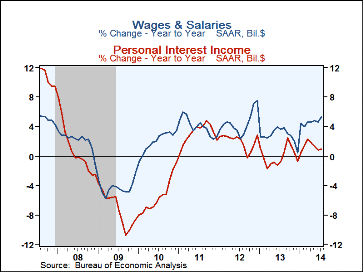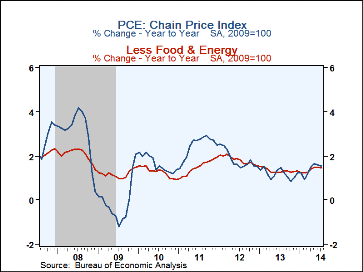 Global| Aug 29 2014
Global| Aug 29 2014U.S. Personal Spending Dips As Savings Increase
by:Tom Moeller
|in:Economy in Brief
Summary
Personal consumption expenditures edged 0.1% lower last month (+3.6% y/y) following an unrevised 0.4% June increase. It was the first decline in six months. A 0.2% rise had been expected in the Action Economics Forecast Survey. When [...]
Personal consumption expenditures edged 0.1% lower last month (+3.6% y/y) following an unrevised 0.4% June increase. It was the first decline in six months. A 0.2% rise had been expected in the Action Economics Forecast Survey. When adjusted for price inflation, spending was off 0.2% (+2.0% y/y). Real spending on motor vehicles led last month's decline with a 2.0% drop (+6.7% y/y) following two months of strong increase. Home furnishings outlays gained 0.3% (5.5% y/y) after a 0.1% rise and spending on recreational goods jumped 0.6% (8.0% y/y) after a 0.7% increase. To the downside, real nondurables spending fell 0.2% (+1.1% y/y), the second month of decline in three. Real spending on gasoline was off 1.0% (-1.5% y/y), the fifth monthly decline this year. Food & beverages spending fell 0.2% (+0.2% y/y) but apparel spending ticked up 0.1% (-0.2% y/y) after two months of decline. Real spending on services edged 0.1% lower (+1.7% y/y) and has been roughly unchanged all year. Continuing strong were financial services outlays, up 0.5% (3.7% y/y), and spending at restaurants & hotels, up 0.1% (3.3% y/y). Housing & utilities outlays fell 0.7% (+0.3% y/y) and health care outlays remained steady (1.3% y/y), ticking 0.2% lower since December.
The personal saving rate improved to 5.7%, the highest level since the end of 2012. The amount of saving in July increased 4.2% (15.7% y/y).
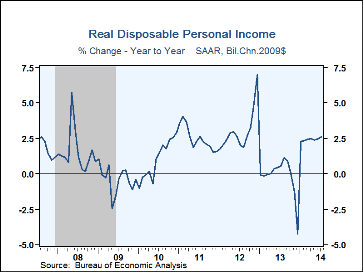 Personal income notched 0.2% higher during July (4.3% y/y)
following a 0.5% June rise, revised from 0.4%. It was the weakest gain
this year. Consensus expectations were for a 0.3% rise. Wages &
salaries rose 0.2% (5.3% y/y) following two months of 0.4% increase.
Proprietors' income declined 0.2% (+3.9% y/y) following a 0.9% jump.
Rental income increased 0.9% (7.6% y/y) after two 0.6% increases. Earnings
from dividends rose 0.4% (2.6% y/y) but interest income slipped 0.1% (+0.9%
y/y), after three months of 0.4% increase. Transfer payments improved 0.3%
and were up 4.6% y/y. The gain was led by a 2.5% jump (8.0% y/y) in
veterans benefits and a 1.4% surge (9.9% y/y) in Medicaid payments. Social
security receipts slipped 0.1% (+4.3% y/y). Disposable personal income
gained 0.1% (4.2% y/y) following three consecutive 0.5% increases. In real
terms, disposable income ticked 0.1% higher (2.6% y/y) after three
straight 0.3% increases.
Personal income notched 0.2% higher during July (4.3% y/y)
following a 0.5% June rise, revised from 0.4%. It was the weakest gain
this year. Consensus expectations were for a 0.3% rise. Wages &
salaries rose 0.2% (5.3% y/y) following two months of 0.4% increase.
Proprietors' income declined 0.2% (+3.9% y/y) following a 0.9% jump.
Rental income increased 0.9% (7.6% y/y) after two 0.6% increases. Earnings
from dividends rose 0.4% (2.6% y/y) but interest income slipped 0.1% (+0.9%
y/y), after three months of 0.4% increase. Transfer payments improved 0.3%
and were up 4.6% y/y. The gain was led by a 2.5% jump (8.0% y/y) in
veterans benefits and a 1.4% surge (9.9% y/y) in Medicaid payments. Social
security receipts slipped 0.1% (+4.3% y/y). Disposable personal income
gained 0.1% (4.2% y/y) following three consecutive 0.5% increases. In real
terms, disposable income ticked 0.1% higher (2.6% y/y) after three
straight 0.3% increases.
The chain price index nudged 0.1% higher in July (1.6% y/y) after four 0.2% increases. Energy prices fell 0.4% (+2.4% y/y) but food prices gained 0.3% (2.0% y/y). Durable goods prices slipped 0.1% (-2.3% y/y) while nondurable prices increased 0.1% (1.5% y/y). Services prices were up 0.1% (2.2% y/y). Prices excluding food & energy edged 0.1% higher (1.5% y/y) for a second month.
The personal income & consumption figures are available in Haver's USECON and USNA databases. The consensus expectation figure is in the AS1REPNA database.
| Personal Income & Outlays (%) | Jul | Jun | May | Y/Y | 2013 | 2012 | 2011 |
|---|---|---|---|---|---|---|---|
| Personal Income | 0.2 | 0.5 | 0.5 | 4.3 | 2.2 | 5.2 | 6.2 |
| Wages & Salaries | 0.2 | 0.4 | 0.4 | 5.3 | 2.8 | 4.5 | 4.0 |
| Disposable Personal Income | 0.1 | 0.5 | 0.5 | 4.2 | 1.0 | 4.9 | 5.0 |
| Personal Consumption Expenditures | -0.1 | 0.4 | 0.3 | 3.6 | 3.6 | 3.7 | 4.8 |
| Personal Saving Rate | 5.7 | 5.4 | 5.4 | 5.1 (Jul '13) |
4.9 | 7.2 | 6.0 |
| PCE Chain Price Index | 0.1 | 0.2 | 0.2 | 1.6 | 1.2 | 1.8 | 2.5 |
| Less Food & Energy | 0.1 | 0.1 | 0.2 | 1.5 | 1.3 | 1.8 | 1.5 |
| Real Disposable Income | 0.1 | 0.3 | 0.3 | 2.6 | -0.2 | 3.0 | 2.5 |
| Real Personal Consumption Expenditures | -0.2 | 0.2 | 0.1 | 2.0 | 2.4 | 1.8 | 2.3 |
Tom Moeller
AuthorMore in Author Profile »Prior to joining Haver Analytics in 2000, Mr. Moeller worked as the Economist at Chancellor Capital Management from 1985 to 1999. There, he developed comprehensive economic forecasts and interpreted economic data for equity and fixed income portfolio managers. Also at Chancellor, Mr. Moeller worked as an equity analyst and was responsible for researching and rating companies in the economically sensitive automobile and housing industries for investment in Chancellor’s equity portfolio. Prior to joining Chancellor, Mr. Moeller was an Economist at Citibank from 1979 to 1984. He also analyzed pricing behavior in the metals industry for the Council on Wage and Price Stability in Washington, D.C. In 1999, Mr. Moeller received the award for most accurate forecast from the Forecasters' Club of New York. From 1990 to 1992 he was President of the New York Association for Business Economists. Mr. Moeller earned an M.B.A. in Finance from Fordham University, where he graduated in 1987. He holds a Bachelor of Arts in Economics from George Washington University.
More Economy in Brief
 Global| Feb 05 2026
Global| Feb 05 2026Charts of the Week: Balanced Policy, Resilient Data and AI Narratives
by:Andrew Cates


